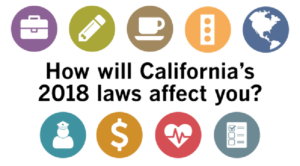 California 2018 Minimum Wage
California 2018 Minimum Wage
California employers must comply with the state’s minimum salary requirement for Administrative Exempt (salaried) employees. In California, Administrative Exempt employees must earn a monthly salary of no less than two times the state minimum wage for full-time employment.
Administrative Exempt Employee Salary Requirement
(Employers with 26 or more employees)
This does not apply to Executive Exempt, Professional Exempt, Computer Exempt or Outside Sales Exempt employees.
- As of January 1, 2018: CA minimum wage = $11.00 per hour
San Diego’s minimum wage = $11.50 per hour - 40 hours per week: Full-time employee works 40 hours in a week
- 52 weeks per year: Full-time employee works 52 weeks in a year
- 2,080 hours per year: Full-time employee works 2,080 hours in a year (40 hours x 52 weeks = 2,080)
- $45,760 per year minimum: Minimum annual salary for a full-time, administrative exempt employee ($11.00 x 2= $22.00 x 2,080 = $45,760)
- $3,813.33 per month minimum: Minimum monthly salary for a full-time, administrative exempt employee ($45,760 ÷ 12= $3,813.33)
Administrative Exempt Employee Salary Requirement
(Employers with 25 or less employees)
This does not apply to Executive Exempt, Professional Exempt, Computer Exempt or Outside Sales Exempt employees.
- As of January 1, 2018: CA minimum wage = $10.50 per hour
San Diego’s minimum wage = $11.00 per hour - 40 hours per week: Full-time employee works 40 hours in a week
- 52 weeks per year: Full-time employee works 52 weeks in a year
- 2,080 hours per year: Full-time employee works 2,080 hours in a year (40 hours x 52 weeks = 2,080)
- $43,680 per year minimum: Minimum annual salary for a full-time, administrative exempt employee ($10.50 x 2= $21.00 x 2,080 = $43,680)
- $3,640 per month minimum: Minimum monthly salary for a full-time, administrative exempt employee ($43,680 ÷ 12= $3,640)
Local Minimum Wage
Employers must comply with both state and federal minimum wage laws. Whichever law gives employees a higher wage rate governs. But, to make it even more complicated, a local entity (a city or a county) may also enact a minimum wage rate that is higher than the state or federal minimum. Therefore, employers must know the federal, state, and local minimum wage rates—and choose whichever one gives the employees more.
Example
The City of San Diego’s minimum wage is $11.50, and will remain so until January 1, 2019. Since San Diego has a higher wage rate than California’s rate of $10.50 (or $11.00, depending on the amount of employees; see above) and the federal rate of $7.25, San Diego employers must pay their hourly employees a minimum wage of $11.50 through January 1, 2019.
Note: The exempt minimum salary requirement is based on the current state minimum wage, not any applicable local minimum wage.
Other New 2018 Laws Affecting California Employers
- Ban-the-box legislation, restricting employers from asking about criminal history on job applications (businesses with 5 or more employees)
- A new law banning all employers from asking job applicants about their prior salary history
- Unpaid, job-protected parental leave for baby bonding (businesses with 20 or more employees)
- New rules relating to worksite immigration enforcement
- Expanded discrimination, harassment and retaliation protections, including new sexual harassment prevention training requirements
- Wage-and-hour enforcement
- Workplace safety and workers’ compensation